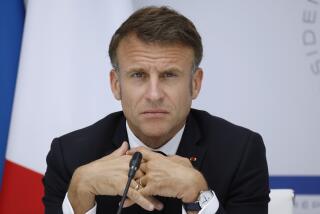ECONOMICS : EU Strains Under Currency Goal
- Share via
BRUSSELS — Many Americans discount Europe’s goal of creating a common currency by the end of the century as one more romantic idea from the Old World, a vague, woolly concept waiting for its time to come.
Not the Europeans.
For them, the glow of ideological commitment to the idea made four years ago in the Dutch town of Maastricht has given way to cold reality as governments begin to face the tough choices needed to become part of what is formally known as the European Monetary Union, or EMU.
Last month, Austria’s government collapsed in a bitter dispute over the extent of budget cuts required to prepare the country for membership in the currency union.
The crunch could come elsewhere soon as the liberal-spending social democracies of Western Europe embark on an unprecedented round of belt-tightening to get ready. The launch of a full-fledged currency union among at least a minority of the European Union’s 15-member states is now barely more than three years away--Jan. 1, 1999.
It is the stringent fiscal requirements for joining an EMU--requirements demanded by Germany, whose strong mark is the endeavor’s crown jewel--that are causing the strain. These include reducing budget deficits to no more than 3% of gross domestic product and keeping national debt below 60% of GDP.
Only Germany and tiny Luxembourg are even close to meeting the criteria now.
The economic and political stakes are considered enormous.
To many, a common currency is the ultimate insurance that Europe’s major nations will never turn against each other in war. It is widely seen as the glue needed to hold the current union together and the prerequisite for deeper European unity.
Still, the path is likely to be arduous.
In many countries, the fiscal discipline needed to get ready collides with the need to cut unemployment. Nowhere is this dilemma more visible--or more important--than in France, where Prime Minister Alain Juppe’s government is about to confront powerful trade unions as it embarks on its EMU-linked austerity program to cut budget deficits. But with the latest unemployment figures in France showing a rise in the jobless rate to 11.5%, it remains unclear whether Juppe can prevail.
“It’s an uphill battle for France, but I believe the French politicians are ready to shoulder the burden,” said Norbert Walter, who heads the Deutsche Bank’s research wing, DB Research, in Frankfurt, Germany.
Resistance, however, will be strong.
The state-owned national railroad faced a strike last week, while teachers and civil servants’ unions plan national protests for later this month in what is seen as the start of a major test of political wills.
While financial specialists and government leaders agree that an EMU could be launched successfully without all EU members in it initially, they all agree that because of the pivotal nature of the Franco-German relationship, it cannot begin without both France and Germany.
But in Germany, Chancellor Helmut Kohl also faces an uphill battle. While the German economic indicators are on target, public attitudes are not.
The latest opinion poll on the issue shows that a little more than one in four Germans is ready to trade marks for a common European currency. For Germans, this reluctance is more than just the practicality of not wanting to give up one of the world’s bellwether currencies. For them, the mark has also become a rare symbol of German power that is anchored in democracy and untainted by history.
The opposition Social Democrats, desperate for new vote-winning issues, this week broke a long-honored political consensus and began to question what was previously considered an issue too important to dispute.
Government response was swift, with Foreign Minister Klaus Kinkel accusing the Social Democrats of jeopardizing the process of European integration with “cheap populism.”
With France and Germany facing different but equally serious difficulties, some have suggested the EMU be delayed.
(BEGIN TEXT OF INFOBOX / INFOGRAPHIC)
Who Might Make the Cut
European Union countries must meet a stringent set of fiscal requirements before they can participate in a common European currency system. Among the criteria:
- Gross public debt may not be above 60% of gross domestic product.
- Inflation must not be more than 1.5 percentage points above the average of the three member states with the lowest levels.
A forecast of which EU countries will meet the criteria by the end of 1998:
PROBABLE *--*
Gross gov’t debt/GDP* Inflation rate Luxembourg 8 3.0 Germany 52 2.5 Britain 52 3.0 Austria 57 3.0 France 58 2.5
*--*
POSSIBLE *--*
Gross gov’t debt/GDP* Inflation rate Finland 56 3.5 Ireland 72 2.5 Denmark 73 3.0 Netherlands 76 2.2 Belgium 125 2.5
*--*
LITTLE OR NO CHANCE *--*
Gross gov’t debt/GDP* Inflation rate Portugal 68 5.0 Spain 75 4.0 Sweden 92 2.5 Italy 124 5.0 Greece 110 6.0
*--*
* in percentages
SOURCE: Organization for Economic Cooperation and Development, European Commission, Independent Strategy
More to Read
Sign up for Essential California
The most important California stories and recommendations in your inbox every morning.
You may occasionally receive promotional content from the Los Angeles Times.













